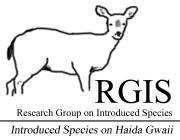

- Menu
- Home
- Haida Gwaii
- Introduced Species
- RGIS
- What did we learn?
- Research
- Publications
- RGIS symposium
- School curriculum
- Contacts
- English
- Français
Publications - Insect ecology |
|
|
Sylvain
Allombert, Steve Stockton, Jean-Louis Martin, 2005, A Natural Experiment on the Impact of
Overabundant Deer on Abstract: In large parts of |
|
Jean-Louis Martin, 2006, Could deer overabundance impact terrestrial molluscs? – A response to Örstan, Tentacle No. 14—January 2006, |
|
|
|
|
| return to top of page | |